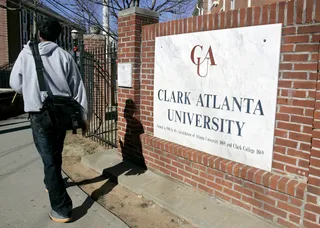Report: 7 Issues HBCUs Face Now and in the Future
A look at how Black colleges can reinvigorate themselves.

1 / 9
Is There a Future for HBCUs? - Historically Black colleges and universities continue to serve as unique academic spaces for African-American students. But some are facing trouble and their relevancy today has been questioned. As the institutions look to the future, how will they continue to thrive? The Association of Governing Boards released a report breaking down the seven strategic issues HBCUs are facing now and in the coming years. BET.com covers those issues here. — Natelege Whaley (@Natelege_) (Photo: Nathaniel Grann / For The Washington Post)

2 / 9
Issue One: Enrollment and the Value Proposition - HBCUs were founded during a time of segregation and discrimination. In the present, Black students now have more options and presidents of Black colleges are up against predominantly white institutions when it comes to recruiting top students. Some have been recruiting more Latinos. HBCUs must also rewrite their story for the 21st century to explain why an education at their institution is still valuable as the world changes. (Photo/: REUTERS/Tami Chappell /Landov)
Photo By Photo: REUTERS/Tami Chappell /Landov

3 / 9
Issue Two: Educational Quality and Degree Offerings - As HBCUs take more heat for the quality of their education, they are reevaluating their program offerings and missions. The report states that institutions must make the learning outcomes of their students a priority if they want to improve their reputation and provide programs that fit the students’ needs. (Photo: Jahi Chikwendiu/The Washington Post)

4 / 9
Issue Three: Student Completion - Because HBCUs admit many first-generation, low-income students and/or those who are under-prepared for college, they have always faced the difficult challenge of retaining students so that they complete their courses and graduate. This challenge involves providing student support programs and retaining experienced professors who are dedicated to the mission of HBCUs. (Photo: Chip Somodevilla/Getty Images)

5 / 9
Issue Four: Finances and Affordability - Historically, Black colleges have been lower in cost, but many cannot afford to continue running effectively with lower priced tuition. Public HBCUs have seen a decline in support from the federal government. Students are demanding high quality resources and HBCUs are constantly challenged with doing more with less money. Fifty-five percent of the presidents who answered the survey said that their institutions had considered reevaluating their current business models in an effort to find financial stability. (Photo: AP Photo/Gerald Herbert)
ADVERTISEMENT

6 / 9
Issue Five: Infrastructure - Technology, Wi-Fi, new buildings and updated facilities are what parents and students are looking for when they enter a college campus for the first time. It is expensive to keep these services up-to-date and institutions on a stricter budget will have issues keeping up with maintenance. The report states that HBCUs must plan to allocate their money and focus on the areas on campus that are most used and needed by students. (Photo: AP Photo/News & Record, Jerry Wolford)

7 / 9
Issue Six: Federal and State Policy - As parents find it harder to get approved for loans because of changes in federal policy, HBCUs have seen a decrease in student enrollment. Some public HBCUs are being threatened by policies that may advocate for their closure. Some institutions may also bring on individuals to their boards that do not understand the unique contributions HBCUs add to society. Having members who will advocate for funding for their institutions can make the difference between the school succeeding and falling further into hard times. (Photo: AP Photo/J. David Ake)

8 / 9
Issue Seven: Leadership - Board retention, recruitment and understanding of board roles were mentioned as the main concern for presidents of HBCUs, according to the report. Other issues mentioned are the high turnover of HBCU presidents and board culture that is effective, transparent and aligns with the goals of the president. (Photo: WikiCommons) Morgan State University
